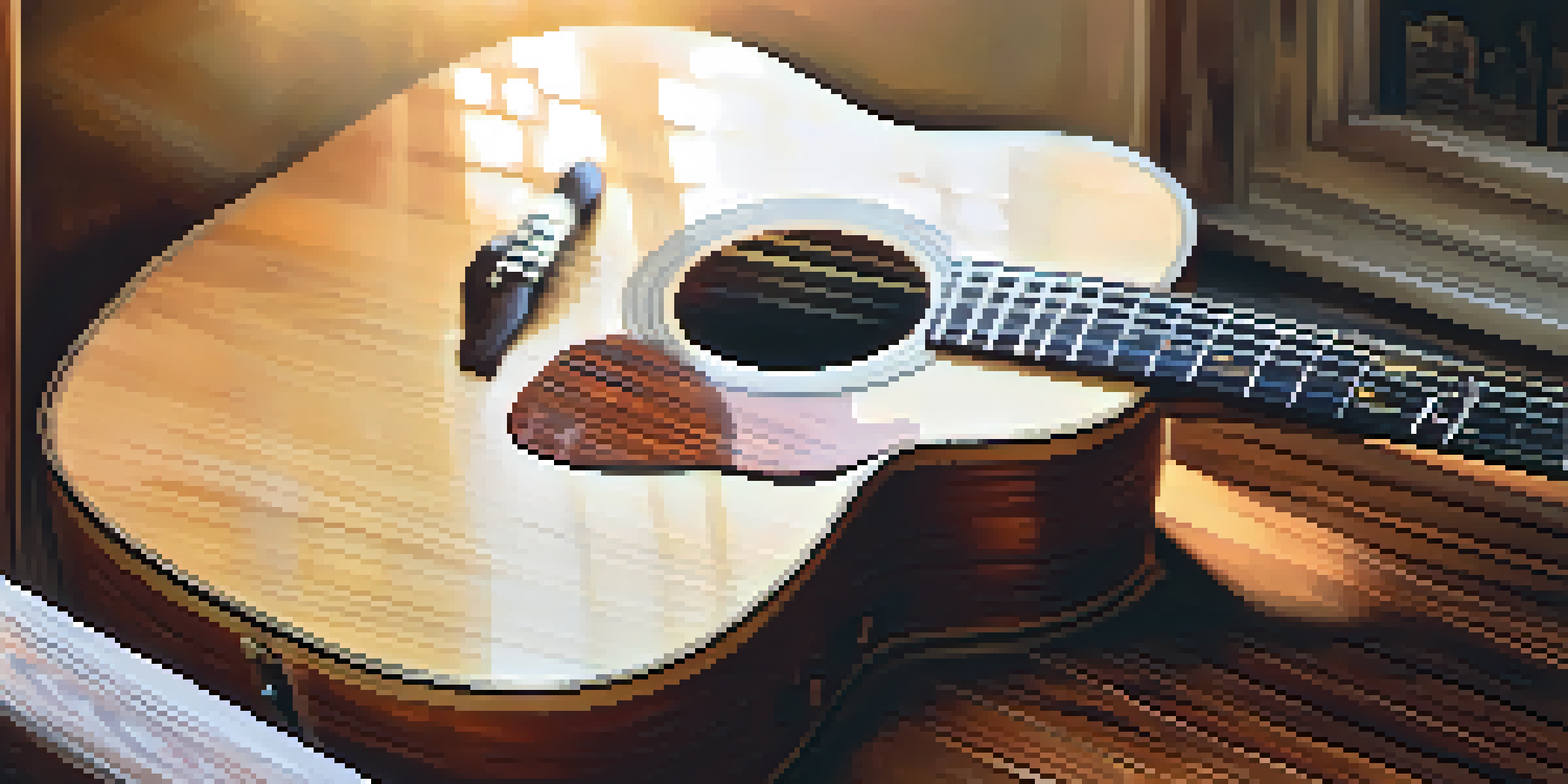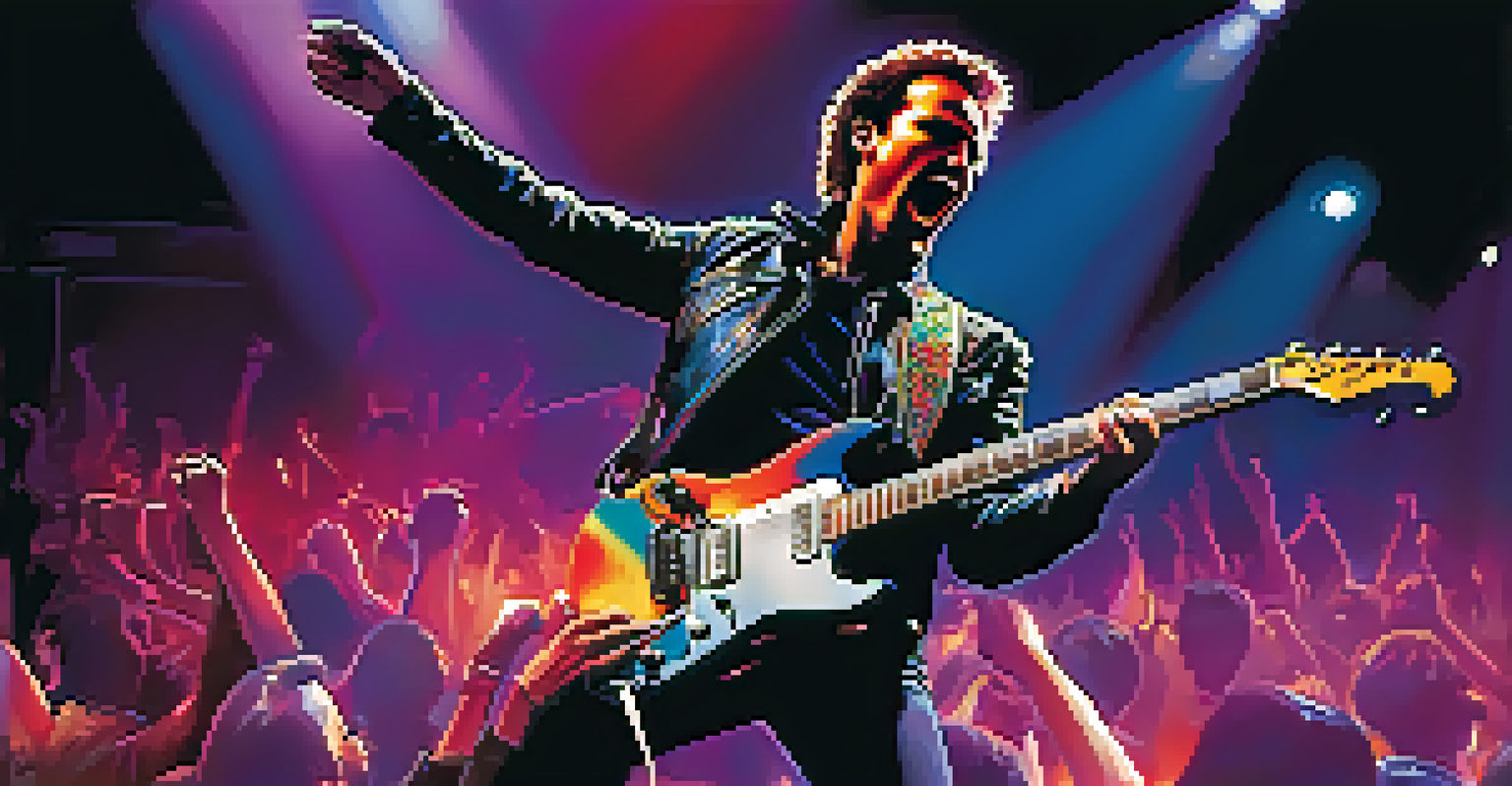The Role of the Guitar in Modern Music Composition

The Guitar: A Versatile Instrument in Music
The guitar has long been cherished for its versatility, making it a staple in various genres. From rock to jazz, its ability to adapt to different styles is unparalleled. This adaptability allows composers to explore a wide range of sounds, enriching their musical creations.
The guitar is a miniature orchestra in itself.
One reason for the guitar's popularity is its accessible range of tones, from soothing melodies to powerful riffs. For instance, a simple acoustic strum can evoke feelings of nostalgia, while an electric guitar solo can ignite excitement and energy in listeners. This dynamic range allows composers to express emotions effectively.
Furthermore, the guitar's portability makes it a favorite among musicians on the go. Whether at a campfire or in a studio, its presence can spark creativity and collaboration, inspiring new compositions that might not have emerged otherwise.
Guitar Techniques That Influence Composition
Guitar techniques such as fingerpicking, strumming, and tapping can significantly influence the composition process. Each technique brings a unique flavor to the music, allowing composers to explore different rhythms and textures. For example, fingerpicking often lends a softer, more intricate sound, ideal for ballads.

The flexibility of the guitar also means that musicians can blend techniques. A composer might start with a simple strum and transition into a complex tapping sequence, creating a dynamic piece that keeps listeners engaged. This ability to mix and match techniques opens up endless possibilities for innovation.
Guitar's Versatility in Genres
The guitar's adaptability allows it to seamlessly fit into various musical genres, from rock to classical.
Moreover, these techniques can inspire composers to think outside the box, leading to unexpected musical ideas. When a guitarist experiments with a new strumming pattern, it might spark an entirely new melody or chord progression, proving that the instrument can be a powerful tool for creativity.
The Guitar in Different Musical Genres
From rock to classical, the guitar plays a crucial role in shaping various musical genres. In rock music, electric guitar solos often take center stage, driving the energy of the song. Conversely, in classical music, the acoustic guitar can convey delicate emotions through intricate fingerstyle arrangements.
The guitar is the easiest instrument to play and the hardest to play well.
In pop music, the guitar serves as a bridge between catchy melodies and engaging rhythms, often complementing electronic elements. Songs like Taylor Swift's hits showcase how the guitar can blend with other instruments to create a memorable sound. This cross-genre collaboration exemplifies the guitar's adaptability.
Additionally, genres like flamenco and blues highlight the guitar's cultural significance, showcasing traditional styles that have evolved over time. These genres not only celebrate the guitar's history but also inspire modern composers to incorporate diverse influences into their work.
The Role of Technology in Guitar Composition
Technology has transformed how guitarists compose and produce music. Digital audio workstations (DAWs) allow musicians to layer tracks, experiment with effects, and refine their sound in ways that were once unimaginable. This accessibility to high-quality production tools has democratized music composition.
Moreover, guitarists can now access a wealth of online resources, from tutorials to virtual collaboration platforms. These tools enable musicians to learn new techniques and connect with other artists worldwide, fostering a global community of creativity. For instance, a guitarist in one country can collaborate with a vocalist halfway across the globe.
Influence of Techniques on Composition
Different guitar techniques, like fingerpicking and strumming, significantly shape the composition process and inspire creativity.
The integration of technology has also led to the rise of guitar-centric software and plugins, allowing composers to simulate various guitar sounds and styles. This innovation not only enhances creativity but also encourages experimentation, pushing the boundaries of traditional composition.
Influential Guitarists in Modern Music
Numerous influential guitarists have shaped contemporary music, serving as inspiration for aspiring composers. Artists like Jimi Hendrix and Eric Clapton revolutionized guitar playing, introducing innovative techniques that changed the landscape of rock music. Their iconic styles continue to influence new generations of musicians.
In recent years, guitarists like John Mayer and St. Vincent have blended genres, incorporating elements of blues, pop, and indie into their work. This genre-bending approach showcases the guitar's versatility and its ability to adapt to modern musical trends. Composers today can draw from these influences to create unique sounds.
Furthermore, the rise of social media has allowed these guitarists to share their work and connect with fans more directly. This interaction fosters a sense of community and encourages aspiring musicians to experiment with their compositions, inspired by their idols.
Collaborative Composition: The Guitar's Role
The guitar often serves as a focal point for collaboration in music composition. When musicians come together, the guitar can act as a common ground, bridging different musical backgrounds and styles. This instrument encourages dialogue among artists, leading to innovative musical ideas.
For instance, a singer-songwriter might collaborate with a guitarist to create a new song, blending lyrics with melodies that complement each other beautifully. This partnership can lead to unexpected outcomes, as each artist brings their unique perspective and skills to the table.
Technology Enhances Guitar Music
Advancements in technology provide guitarists with new tools for composition, expanding their creative possibilities.
Moreover, collaborative projects allow musicians to learn from one another, enhancing their skills and broadening their creative horizons. The guitar's role in these collaborations highlights its importance not just as an instrument but as a catalyst for artistic growth.
The Future of Guitar in Music Composition
As music continues to evolve, the guitar will undoubtedly remain a vital instrument in modern composition. Emerging genres and styles often incorporate guitar elements, ensuring its relevance in the ever-changing musical landscape. This adaptability makes the guitar a timeless choice for composers.
Furthermore, advancements in technology will likely enhance the guitar's role in music creation. New tools and platforms will empower musicians to explore unique sounds and collaborate in innovative ways. As a result, we can expect to see the guitar influencing not just individual compositions but entire genres.

Ultimately, the guitar's ability to inspire creativity and foster collaboration ensures its place in the future of music composition. Whether through traditional playing or innovative techniques, the guitar will continue to be a powerful instrument for artistic expression.